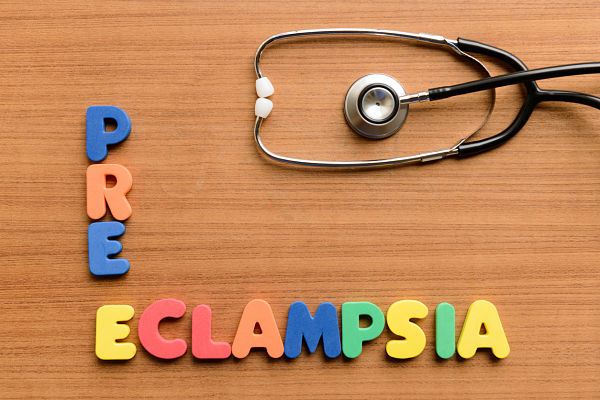The possible link between thyroid conditions and pre-eclampsia

You have no doubt heard of “pre-eclampsia” which is a condition which occurs in about 5% of pregnant women in the UK during the second half of their pregnancy. What you may not know is that one of the risk factors for pre-eclampsia may possibly be the presence of a thyroid condition which may or may not have been previously detected.
Signs and symptoms of pre-eclampsia
The early signs of pre-eclampsia vary in individuals but typically may include
- Swelling – often the hands and feet
- Headaches- ranging from brief to severe and of mixed duration
- Disturbed vision – flashes or black spots or short periods of no vision
- Feeling sick or actually vomiting
- Passing urine less frequently
- Nose bleeds
- Feeling hot and overheated
- Spasms or twitching
- Feeling breathless
- And in some cases experiencing pain at the top of the abdomen near the ribs
Unfortunately, these symptoms are easy to miss with women perhaps believing it’s “one of those things” you experience when pregnant. So the first indications are often at regular check-ups when there may be a high blood pressure reading; excessive protein in the urine; or poor kidney function which had been picked up during a blood test.
At this point other symptoms may well be brought into focus. By the way, women can also develop or continue with pre-eclampsia during the birth OR develop late onset pre-eclampsia after birth so you should continue to keep an eye open for high blood pressure and any of the above symptoms for some time after pregnancy particularly if you have a thyroid condition.
The risks of untreated pre-eclampsia
Pre-eclampsia tends to escalate quite quickly and the more severe the condition, the greater the risk of complications. Fortunately only 1 in 100 women with pre-eclampsia go on to develop the full blown condition which - left untreated - has serious consequences for both the mother and the baby:
The baby:
- may experience a lack of nutrients and oxygen which can affect its growth
- may be premature and not fully developed which can entail breathing, or feeding problems and at risk of infection with an immature immune system
- may be at higher risk to future health problems
The mother
- can develop impaired liver and kidney function, blood clotting difficulties, fluid on the lungs and seizures
- suffer from the placenta separating from the womb
- can later develop an underactive thyroid
- can experience organ failure in severe cases
Unfortunately, the condition can actually be fatal for both mother and baby
Why is a thyroid condition linked with pre-eclampsia?
The theories:
The cause of pre-eclampsia is still poorly understood. There are currently three theories:
- The mother develops an immune response to her own placenta
- The blood vessels in the mother’s womb may not be wide enough to carry the essential oxygen and nutrients to the foetus
- A previous auto immune condition (like Hashimoto’s) may exacerbate or trigger the changes to lead to pre-eclampsia developing.
The links
There are several similarities between thyroid conditions and pre-eclampsia. For example, those with hypothyroid are more prone to high blood pressure and may develop a poor flow of blood to and from the kidney as muscle contractions in the arteries and veins become less efficient.
Research continues but it is now believed that testing a pregnant mother’s hCG levels may indicate the likelihood of pre-eclampsia occurring. hCG is connected to the thyroid hormone because it stimulates an increased thyroid function at a time when a pregnant woman has an increased demand for that hormone.
The increased risk
A 2016 study at the University medical Centre in Rotterdam tested over 5,000 women at below 18 weeks gestation looking at TSH, thyroxine and hCG
This revealed the following increased risk to developing pre-eclampsia
- An 11 fold increase for those with high levels of thyroid hormone and low levels of hCG
- There was no increased risk for women with high levels of thyroid hormone and high levels of hCG
You may want to read the complete article on this
There is also an increased risk of mothers with pre-eclampsia subsequently developing thyroid problems
Conclusion
Research into this condition continues. We are still not completely sure whether pre-eclampsia contributes to an underactive thyroid, or if an underactive thyroid contributes to pre-eclampsia. It may even be that people with a certain physiology are more likely to develop both conditions.
I hope this has been helpful, if you are interested in this post you may also want to read:
- Antenatal/postnatal medication for women with a thyroid or diabetic conditions
- Morning sickness and its effect on thyroid function
- Preparing for a successful pregnancy with a thyroid condition
Although every effort is made to ensure that all health advice on this website is accurate and up to date it is for information purposes and should not replace a visit to your doctor or health care professional.
As the advice is general in nature rather than specific to individuals Dr Vanderpump cannot accept any liability for actions arising from its use nor can he be held responsible for the content of any pages referenced by an external link










